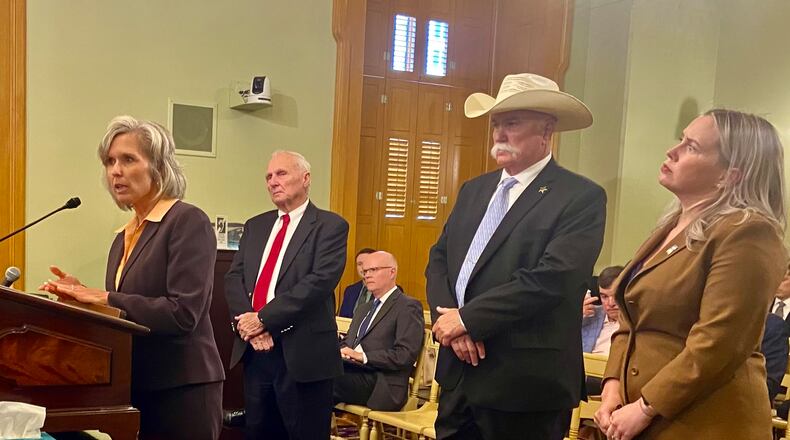Madison Twp. Republican Rep. Thomas Hall and Rep. Adam Bird, a Clermont County Republican, introduced the legislation — that mirrors a budget amendment Sen. George Lang attached to the Senate budget bill — to vet the measure so it will hopefully remain in the state’s two-year spending plan. The bill was referred to Ways and Means.
Rep. Riordan McClain, R-Upper Sandusky, remarked about the show of force from the county.
“Do we have a statute for the number of officials from a county that counts as an invasion of the statehouse?” McClain joked. “I think Butler County may be pushing the limits here.”
The sheriff told the committee the estimated 42% value hike — values in Clermont County are going up 43% — would be a disaster, just like after the Great Recession when sheriff’s sales soared from 93 a year to 3,300.
He said as a law enforcement official he sees people are angry and frustrated and things are getting to the boiling point.
“I’ve never seen times like this and I’ve seen people that have never been angry, they’re angry, you step on their toes you’re liable to have to fight...,” Jones said. “We need your help, 42% is big increase and some are more than that. We just need some help and your wisdom to help us figure this out, sooner than later, this isn’t something that can go like a year from now.”
That’s why Lang and Hall jumped quickly to introduce “Band-aid” legislation — after Dixon issued a “call to action” by local leaders — because to have an impact on taxpayers this year — the value hikes will determine property taxes for next year —the new budget bill must be the vehicle. HB 187 is mainly in place to cull information on the issue since it was added after the House passed their spending bill.
The state tax commissioner’s recommended value increases were based largely on sales data from 2022, which local officials say were unfairly skewed by pandemic-induced inflation and other ill effects of the historic crisis. The new law would require an equally weighted three-year average and give local auditors more control in the reevaluations.
Nix was asked whether other county auditors agree with the recommended procedure and she said their association voted 34 to 14 to oppose the present solution. However, 41 county auditors didn’t cast votes when the question was called, “I don’t think the vote should have happened it, we weren’t properly notified to have our people in attendance and our arguments represented.”
“I think their opposition springs from leave the values alone it’s a tax problem, they feel like it’s an unbiased situation as it stands,” Nix said but added there are many who are in favor, “We’re in dire straits here.”
Dixon had another perspective on why some auditors might be opposed. He said he had an argument with former auditor Roger Reynolds over taxes that sums up the situation.
“He said my job as the auditor is to keep the county coffers full,” Dixon said. “I said that’s not my job, my job is to make the county run, make it less intrusive for taxes and keep the schools at the top of the list. Auditors and commissioners have a completely different approach on that, I think we see it as a whole, they see it as numbers.”
Part of the reason for vetting the issue before the final budget comes to a vote was to discuss unintended consequences of the law. Properties are fully reassessed every six years and updates based on sales data are done every three years.
McClain agreed the current situation is detrimental to taxpayers undergoing the Triennial update now, but he worried what might happen in the future, if the three-year average works against taxpayers “if we’re going to require this now, potentially three years down the road it may adversely impact somebody in the other direction.”
Clermont County Auditor Linda Fraley, who has been in office for decades, said the Board of Revision process allows taxpayers to get their property values lowered if they believe the auditor’s numbers are unfair.
Butler County officials have said all along this legislation is just a Band-aid to “stop the bleeding” this year, and more comprehensive reforms are crucial. They want to look deeper into the use of tax incentive programs, school funding reform and other longer term solutions.
Rep. Daniel Troy, D-Willowick, said he has “called for a comprehensive study of he entire Ohio property tax system” and favors reinstating rollbacks that disappeared a few years go.
“As we reduce our revenues here, we are basically putting in a situation where there’s an increased demand at the local property tax level,” Troy said. “I really think we need to do a lot more in terms of just totally doing a complete physical examination of Ohio’s property taxes.”
After the committee meeting Hall told the Journal-News the bill will likely not go any further this legislative session because they must ratify the budget early next week, the focus now is to make sure Lang’s amendment stays in the budget.
He said “I believe a majority of our caucus support this idea, to do this and some really powerful people at the leadership level are understanding what it means for our residents.”
Dixon and Nix after the hearing told the Journal-News they felt the committee members “empathize” with their plight.
“I know HB 187 is not the vehicle that will make this happen,” Nix said. “So how they get done, we don’t care how the sausage is made, we just want it to be made.”
COMPLETE COVERAGE
The Journal-News has been covering this topic since the Butler County commissioners issued a “call to action” to other local leaders and state lawmakers in April. Find previous coverage at journal-news.com.
About the Author

